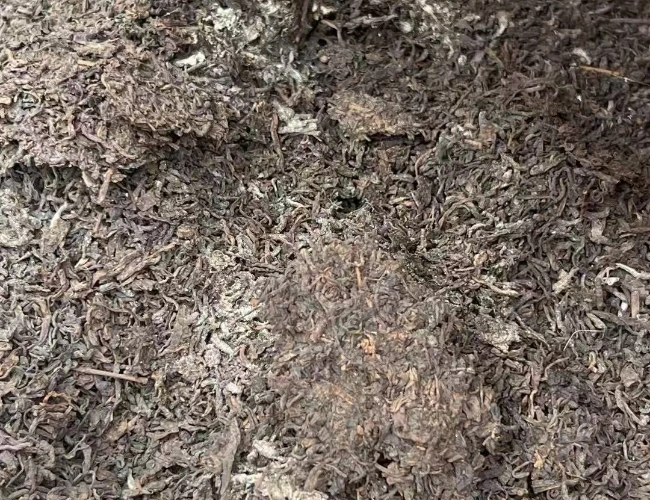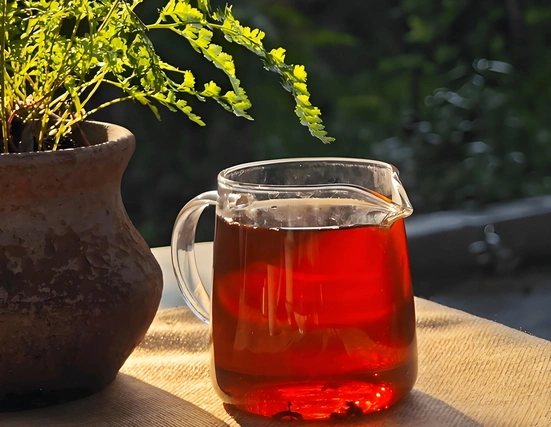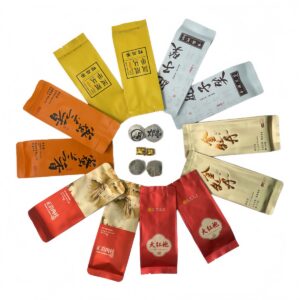Dark tea for gut health invites you on an aromatic journey of warmth and renewal—each cup a gentle embrace for your microbiome. Picture lifting a small clay cup, its surface warm in your hands, as fragrant steam spirals upward, carrying deep notes of forest moss, roasted malt, and a hint of sweet honey. With the first sip, you feel a silky warmth spread through your belly, coaxing comfort and calm. This is the transformative power of dark tea for gut health: centuries-old fermentation chemistry converging with modern science to nurture your digestive well-being.
In this guide, you will uncover the pivotal compounds in dark tea that support a balanced microbiome, explore the latest research on how dark tea enhances intestinal barrier function, and learn practical tips— from brewing to timing— for weaving this ancient elixir into your daily routine. Along the way, you’ll glimpse how dark tea for immune boosting, dark tea in weight loss plans, and dark tea digestion intertwine, creating a holistic tapestry of wellness.

What Is Dark Tea and Why Gut Health Matters
Defining Dark Tea vs. Oolong Tea
Dark tea, known in China as post-fermented tea, includes Pu Erh, Liubao, and Anhua varieties. Unlike green tea (unoxidized) or oolong tea (partially oxidized), dark tea undergoes a secondary microbial fermentation that can last weeks to years. This process transforms simple polyphenols into complex molecules— theabrownins— that give dark tea its signature deep-brown brew and earthy, toasty aroma. Oolong’s floral, stone-fruit notes and moderate oxidation yield catechins and theaflavins, which also support health. However, dark tea for gut health draws its unique strength from fermentation-derived compounds that directly nourish beneficial gut flora and fortify the intestinal barrier.
The Importance of a Healthy Gut Microbiome
Your gut microbiome— trillions of bacteria, yeasts, and other microbes— orchestrates digestion, immunity, and even mood. When this ecosystem is balanced, nutrients absorb efficiently, inflammation subsides, and you feel energized. Disruptions— from stress, poor diet, or antibiotics— can lead to bloating, fatigue, and weakened immunity. That’s why dark tea for gut health matters: its fermented polyphenols and prebiotic fibers feed probiotic bacteria, helping restore equilibrium and resilience from within.
Key Components in Dark Tea That Support Gut Health
Fermentation-Derived Polyphenols and Theabrownins
The magic of dark tea for gut health lies in theabrownins— brown-colored polymers formed as tea catechins polymerize during fermentation. These compounds exhibit potent antioxidant and anti-inflammatory properties. In lab studies, theabrownins have been shown to strengthen tight junction proteins in intestinal cells, reducing “leaky gut” and preventing harmful molecules from entering the bloodstream. Every time you sip dark tea, you deliver these protective molecules to your gut lining, calming inflammation and promoting repair.
Prebiotic Fibers and Probiotic Effects
Beyond polyphenols, dark tea contains soluble fibers and live microbial metabolites that act as prebiotics— the food that fuels beneficial bacteria. As these microbes feast, they produce short-chain fatty acids (SCFAs) like butyrate and acetate, which nourish colon cells and further reinforce gut barrier integrity. Regular consumption of dark tea for gut health can increase levels of Bifidobacterium and Lactobacillus species, key guardians of a harmonious microbiome.
Scientific Research on Dark Tea and Gut Health
Studies on Microbiota Modulation
Recent human trials have highlighted dark tea for gut health’s capacity to reshape microbial communities. In one 8-week study, participants drinking two cups of aged Pu Erh daily saw a 30% increase in beneficial bifidobacteria and a 20% reduction in pro-inflammatory Enterobacteriaceae. These shifts corresponded with decreased bloating and improved stool regularity— clear signs of a happier gut.
Effects on Intestinal Barrier Function
Maintaining a strong intestinal barrier prevents endotoxins from triggering systemic inflammation. Animal studies reveal that dark tea polyphenols enhance expression of tight junction proteins— occludin and zonula occludens— leading to a 25% reduction in gut permeability. This barrier-strengthening effect underpins dark tea for immune boosting, as a sealed gut prevents immune overactivation by rogue antigens.

Additional Wellness Benefits of Dark Tea
Dark Tea for Immune Boosting
When your gut thrives, so does your immune system. Nearly 70% of immune cells reside in the gut-associated lymphoid tissue (GALT). By reinforcing your gut barrier and balancing microbiota, dark tea for gut health indirectly bolsters immunity. Studies show Pu Erh polyphenols enhance macrophage activity and increase anti-inflammatory cytokines, helping you defend against pathogens with grace.
Role in Dark Tea in Weight Loss Plans
Gut health and weight management are intimately linked. A balanced microbiome supports efficient energy extraction and satiety signaling. Incorporating dark tea in weight loss plans provides fermented polyphenols that boost fat oxidation and curb fat absorption, while dark tea digestion support smooth nutrient breakdown, creating a synergy that gently— yet effectively— aids slimming goals.
Dark Tea Digestion and Metabolic Support
Speaking of digestion, dark tea’s theabrownins also stimulate digestive enzymes (lipase and amylase), accelerating lipid and carbohydrate breakdown. In one trial, participants who drank dark tea with a high-fat meal exhibited 15% lower postprandial triglyceride peaks, translating to smoother digestion and steady energy release throughout the day.
Incorporating Dark Tea into Your Daily Routine
Best Times to Drink for Gut Health
To maximize dark tea for gut health, aim for two to three cups per day:
- Morning— upon waking, to awaken your microbiome and kickstart metabolism.
- After Lunch— particularly after a heavier or oily meal, to leverage dark tea digestion and curb fat absorption.
- Afternoon— as a mid-day reset, supporting both gut flora and mental clarity.
Brewing Tips to Maximize Benefits
Use fresh, filtered water at 95–100 °C (203–212 °F). For Western-style brews, steep 5 g of leaves per 250 mL for 3–4 minutes. For a more immersive Gongfu ceremony— ideal for savoring layers—use 6–8 g per 100 mL, rinse quickly, then steep 20–30 seconds, adding 5–10 seconds per subsequent infusion. This approach gently teases out theabrownins without overwhelming astringency, ensuring each cup is both delicious and supportive of dark tea for gut health.

🔗 To learn more about how to make tea, check out Tanbiwencha’s YouTube video explaining how to make tea.
Choosing and Storing High-Quality Dark Tea
Identifying Authentic Varieties
Look for origin-specific labels— Yunnan Pu Erh (Sheng or Shu), Guangxi Liubao, or Hunan Anhua— and harvest dates. Premium leaves appear glossy, intact, and deep in color, with a sweet, earthy aroma. Avoid musty or chemical smells, which signal poor storage or processing.
Storage Practices to Preserve Gut-Health Properties
Preserve dark tea for gut health potency by storing tea in a cool (20–25 °C), moderately humid (55–65%) environment, in breathable containers (clay jars or paper wrappers). Avoid airtight plastic and strong odors. Periodically (every 3–6 months) unwrap teas to ensure healthy aging and prevent mold.
FAQs on Dark Tea for Gut Health
How Much Should I Drink Daily?
Aim for 2–3 cups (500–750 mL) per day. If caffeine sensitivity is an issue, shorten steep times (30–60 seconds) or choose a lightly aged variety with lower caffeine.
Can Dark Tea Replace Probiotics?
While dark tea for gut health provides prebiotic support and fosters beneficial microbes, it does not deliver targeted probiotic strains. Use it alongside, rather than instead of, high-quality probiotic supplements if you require specific therapeutic strains.
Are There Any Side Effects?
Generally safe, but be mindful that tannins can bind dietary iron— if you have anemia, avoid tea within one hour of iron-rich meals. Sensitive individuals may experience mild stomach discomfort; reduce steep times or switch to aged teas to lower tannin levels.
Conclusion: Embrace Dark Tea for a Happier Gut
Recap of Gut-Health Benefits
Dark tea for gut health offers a multifaceted approach: feeding beneficial microbes, strengthening the intestinal barrier, supporting digestion, and bolstering immunity. Its fermented polyphenols and theabrownins make it a uniquely powerful ally for a balanced microbiome and overall well-being.
Encouragement to Make Dark Tea a Daily Ritual
Imagine mornings brightened by a rising sun and a warm cup of dark tea— its earthy aroma setting a tone of mindful nourishment. Let dark tea for gut health become your daily companion: after meals, during breaks, or as part of a quiet evening ritual. Explore different varieties—Pu Erh, Liubao, Anhua—and discover which resonates most with your palate and health goals. Each sip is an invitation to deeper vitality and the joy of a well-tended gut. Embrace this ancient elixir, and let your digestive system—and your life—flourish.



